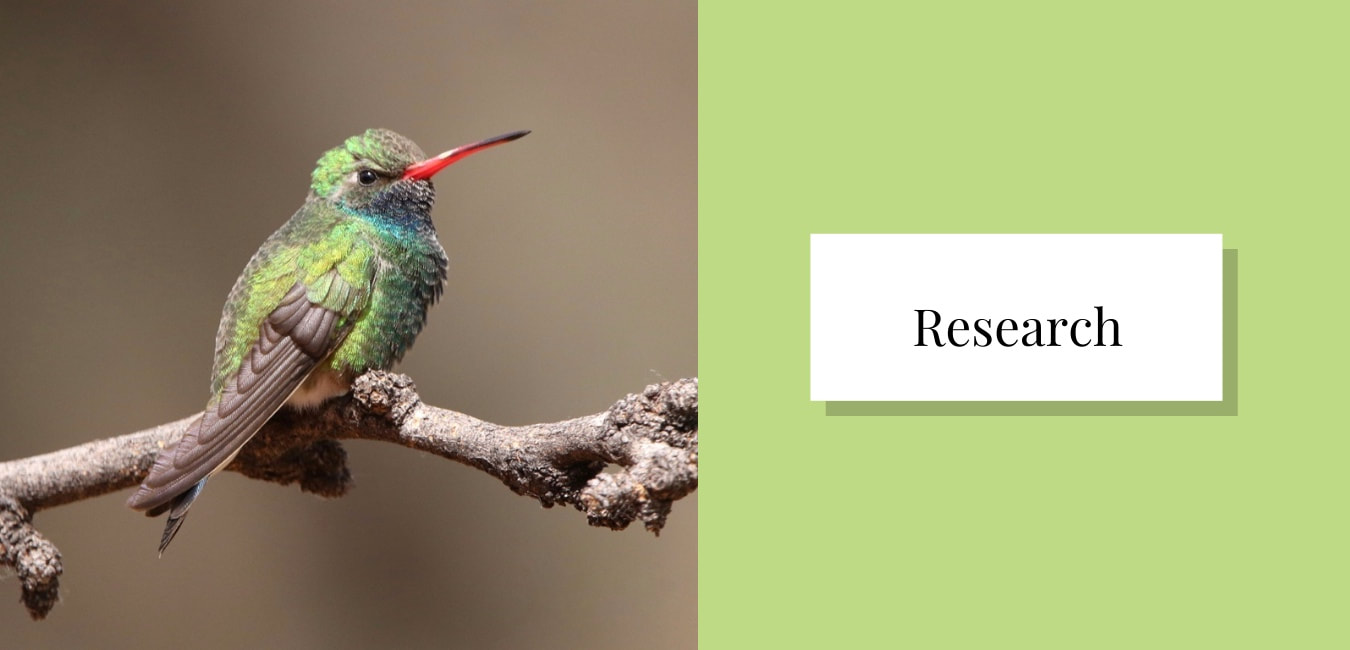Identifying risks of present and future viability of hummingbird populations requires accurate knowledge about their biology and environmental requirements. A scientific inquiry that is well designed, carefully conducted, peer-reviewed, and publicly accessible is key for discovering answers that can guide conservation actions. Research efforts relevant to practical problem solving for on-the-ground conservation issues are critical. This research requires qualified experts who can impartially complete informed reviews at sites across the western hemisphere.
The HCNs' six interrelated research programs, which intend to support the research requirements for effective hummingbird conservation actions:
The HCNs' six interrelated research programs, which intend to support the research requirements for effective hummingbird conservation actions:
- Field Research aiding scientist inquiry
- Publish the Science completing the science with peer reviews
- Internships offering field research experience to young professionals
- Science Meetings communicating discoveries and fostering collaborations for future research
- Grants and Scholarships offer support to students and research partners while providing resources to focus on priority conservation needs.
- Resource Library fostering continued learning
Programs
FIELD RESEARCH
This program intends to partner with crucial local scientists to conduct research projects to gathering critical data about hummingbirds and their habitats. Also, it addresses the lack of information at the local and regional scale in the participating communities of HCCRs and identifies key research topics for hummingbird conservation.
Previous projects in this program included: "Combining remote-sensing and biological data to predict the consequences of climate change on hummingbird diversity"; "Interspecies interactions improving Black-chinned Hummingbird (Archilochus alexandri) nest success"; and "Developing a comprehensive, coordinated monitoring program for hummingbirds;" New projects include: "Habitat requirements of Eupherusa ridgwayi, an endangered hummingbird species in Western Mexico" and a partnership with the Children's Museum in Oaxaca, Mexico.
PUBLISH THE SCIENCE
Publish the Science is a program which aims to submit scientific communications to share our research results, hummingbird population trends, management suggestions, and conservation efforts with the public. Current projects underway include monitoring program results of hummingbirds' abundance, diversity, ecology, and morphology in Arizona, USA, and Northern and Central Mexico.
INTERNSHIPS
This program offers opportunities for field training and research experiences to build and provide research capacities for the study of hummingbirds, applying field techniques in participating territories of HCCRs. In this way, participants will help collect data needed to address hummingbird conservation issues and, at the same time, develop conservation actions. Creating a well-designed internship program could bring multiple benefits to the interns, the organization, and the communities. Interns learn by engaging hands-on new research techniques; the organization obtains essential data for decision-making and, communities acquire relevant information to conduct hummingbird conservation in their territories.
The Latin American Student Internship program began in 2009 because of a proposal made by Dr. Jorge Schondube a professor at UNAM, one of the top public universities in Mexico City. Since then, its scope of students has expanded from Mexico to across the Americas, with 17 students benefiting from the program so far. The USFS International Programs made this program possible, with visas and medical insurance support. Of these interns, six have or will soon complete advanced degrees; four will enter graduate school; two are finishing their undergraduate degrees; three are working in conservation-related jobs; and one is a high school biology teacher. A new program is underway to learn from past experiences and continue contributing to hummingbird conservation efforts.
SCIENCE MEETINGS
This program aims to organize academic meetings to encourage researchers to present and discuss their work about hummingbird studies, connect with like-minded people, to encourage partnerships supporting hummingbird conservation and community involvement. This program's current priority is to create a network of collaboration about specific topics on hummingbird research. Thus, the next meetings will be in Mexico and Arizona.
GRANTS AND SCHOLARSHIPS
This program has the purpose of providing financial and technical support for the academic development of students who will engage in hummingbird research that benefits hummingbird conservation. Undertaken projects include support for a key HCN team element Master's Program at the University of Arizona and scholarships for training workshops and internships.
RESOURCE LIBRARY
This program will provide online access to a bibliographic and audiovisual collection of learning resources and tools for people interested in hummingbird research, conservation, and outreach. We will create an organized database with existing information regarding hummingbird knowledge, research, and conservation (documents, books, videos, pictures, magazines, etc.).



